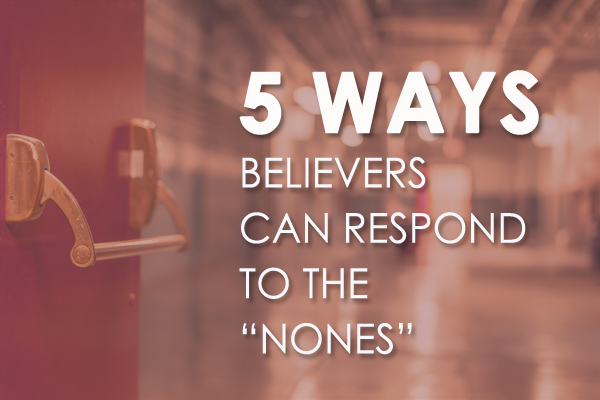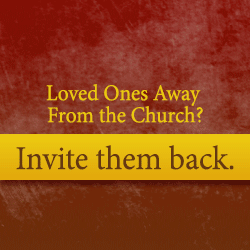 Some of you may have heard the depressing news that the number of people unaffiliated with any religion has grown by leaps and bounds in the United States, causing a drop in the number of Christians.
Some of you may have heard the depressing news that the number of people unaffiliated with any religion has grown by leaps and bounds in the United States, causing a drop in the number of Christians.
The trend is nothing new but the rapidity of the growth is cause for surprise.
When I first heard that the decline of Christianity in the United States is going ahead at a clipped pace, I felt sad.
I also felt pressured to immediately blog on this topic since I have written a book on the subject. But I had to take a couple days just to sit with this news and pray about it with Jesus.
It is not that I am surprised at the numbers. It is not that I am totally depressed and cannot possibly see anything good coming out of this, (in fact, I wrote a positive post looking at the growth of the “Nones” the last time these stats made waves). But, I just needed some time to reorient my reaction to these numbers in God.
During my time in prayer, Jesus’ question in the Gospel of Luke kept ringing in my ears:
But when the Son of Man comes, will he find faith on earth? (18:18)
In my prayer with Jesus, I realized that this was not a rhetorical question. He is asking me. He is asking you. He is asking the entire Church to continue in its perennial mission to spread the Gospel. We are not helpless in the face of these disturbing trends, and there is great reason to have hope.
Here are some concrete, clear things that we can keep in mind and do as we search as a Church together to respond to these trends:
1. Stay Positive and Hopeful: The last thing the Church needs to help with sales is a membership that is pessimistic and long in the face. Pope Francis reiterates this constantly: “The Church is not a refuge for sad people, the Church is a house of joy.” So, let’s remember and rejoice that Catholicism is actually growing worldwide. It is very like us Americans to be myopic and self-involved, but it helps to widen our view and see ourselves as a worldwide, growing Church before we get down to the business of addressing problems here.
2. Embrace This Opportunity for Christian Unity: Evangelicals as well as Catholics are reading the Pew data in ways that provide reason to hope that this trend is not permanent. Also, the decline in numbers did not impact Evangelicals as much as other faiths. In the face of these changes, there is an opportunity for all Christians to work together to help teens and young adults find Jesus. There will be a temptation to circle our perspective wagons and regard other Christian faiths as encroaching in our territory, but in a culture that is fast trying to sideline Christianity, it is time to unite our resources.
(I also have a personal, (slightly wild) hope that the decline of members from mainline traditions could lead to a situation in which people are more open and willing to shed labels and unify churches…beginning with the East and the West. I do see these kinds of ecumenical attitudes in some of my Evangelical friends, one of whom became Orthodox.)
3. Remember, We Know These Numbers: When we read impersonal statistics about millions of people who have left the Church over the past seven years it is easy to get overwhelmed. But let’s remember, we know these people. You may not personally know each and every one of them, but if you take all the faithful Catholics in this country, (at least the ones who attend Mass semi regularly), that is 30 plus million people. If we can inspire and catechize these faithful Catholics and then mobilize them to invite their loved ones back to the Church, that is nothing to sneeze at. You may be thinking, “Yeah right, that is a tall order.”
But we only need remember the words of the angel Gabriel:
“Nothing will be impossible for God” (Lk 1:37).
4. Put Evangelization on the Front Burner: I recently spoke to a pastor in Des Moines who bought fifty copies of The Prodigal You Love: Inviting Loved Ones Back to the Church for his parish. This is a priest who understands that evangelization is the key issue of our time. We need priests, religious and lay people in the Church to put evangelization on the front burner and we need to evangelize on two levels. First, we need to “form intentional disciples” as Sherry Weddell would say. We need to make sure that the people in the pews are followers of Christ, not just in name but in their hearts. And at the same time we need to form people to go out and evangelize their friends and family.
You may question whether we can do this at the same time but the disciples were sent out way before they felt they were ready. In fact, at the end of the Gospel of Matthew we see how unready they were:
When they saw [Jesus], they worshiped, but they doubted. (28:17)
Jesus sees his disciples’ doubt and then tells them to spread the good news!
We are ready to go out.
As the trumpets of these statistics blare, Jesus is sending us out—not as self-confident people who think we have it all figured out—but as humble followers, ready to meet his people one by one.
5. Avoid Attila the “None” Worldviews: It is easy to look at this growing number of unaffiliated “nones” as our enemy. We could paint this group of people as the face of a new, evil secularism and assume they are brainwashed, ignorant, stupid, selfish, lazy or all of the above. In this worldview, we would be happy with a remnant faith that excludes people who don’t think like us and are not on board. This is not Christian. We are here to go out.
Every generation has its problems and needs to be open to the wisdom and experience of previous generations, but every generation also has something to teach us about the truth. Instead of demonizing or patronizing the “nones,” many of whom are in our families and circle of friends, I suggest that it is better to listen, to respect, to establish trust, to love and then to invite them home.
And a bonus:
6. Engage in Self-Examination and Transformation: Responses to the Pew numbers have been varied but I have to say that the majority I have seen are “pointing.” In other words, the blame lies there or over there or in here. I am not disagreeing with these very intelligent analyses of the storm of conditions that led to this situation. But as a wise spiritual director once said to me, “Analysis leads to paralysis.” We cannot control anything in this situation but our own behavior.
As Sherry Weddell writes over on her blog:
Now is the time to respond: “Here I am, Lord. Send me.” Now is the time for a 21st century Generation of Saints.
Instead of preparing for war with a culture that is leaving us behind, we are called as Christians to change ourselves in order to change the culture.
Saints are the most powerful weapon in any spiritual battle.
– – –
Any others wise insights or ideas in the face of the new Pew numbers?
Please leave them in the comments!
More interesting posts on this subject:
Losing My Religion: Why People Are REALLY Leaving the Church (It’s not what you think.) by Dr. Gregory Popcak
Why Are The “Nones” Leaving Religion? by Fr. Dwight Longenecker
Reflections on the Latest Pew Survey Documenting “Religious Decline” – Not So Fast by Msgr. Charles Pope
Fewer Christians, More “Nones” by Mark Movsesian, First Things













